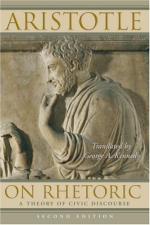
|
| Name: _________________________ | Period: ___________________ |
This quiz consists of 5 multiple choice and 5 short answer questions through Book II, Chapters 12-22.
Multiple Choice Questions
1. As Aristotle explained, in which situations would rhetoric be useful?
(a) Situations where dialectic would be understood.
(b) Situations where dialectic would also be appropriate.
(c) Situations where dialectic would be misunderstood.
(d) Situations where dialectic would be inappropriate.
2. What did Aristotle think the extent of virtues was based on?
(a) Past actions.
(b) Certain accomplishments.
(c) Past associations.
(d) Certain circumstances.
3. Which type(s) of happiness was Aristotle referring to in Book I, Chapter 5?
(a) Individual happiness, equal happiness, and prosperity for the country.
(b) Prosperity for the country.
(c) Equal happiness.
(d) Individual happiness.
4. Why did Aristotle think the completion of a difficult task was pleasant?
(a) What is difficult to get is mostly better than what is easy to get.
(b) What is diffcult to get requires dedication that makes it more rewarding.
(c) What is difficult to get is always better than what is easy to get.
(d) What is difficult to get requires extra effort that makes it more rewarding.
5. Focusing on what they found useful, what did Aristotle say older people cared less about?
(a) Honor, the past, and the opinions of others.
(b) The past and the opinions of others.
(c) Honor and the opinions of others.
(d) Honor and the past.
Short Answer Questions
1. What did Aristotle think a high value of life in older people led to?
2. Which of the following was a reason that Aristotle included as a cause of pity?
3. Who did Aristotle think calmness was felt towards?
4. How did Aristotle define calmness?
5. In Aristotle's opinion, what should a good birth lead to?
|
This section contains 301 words (approx. 2 pages at 300 words per page) |

|




